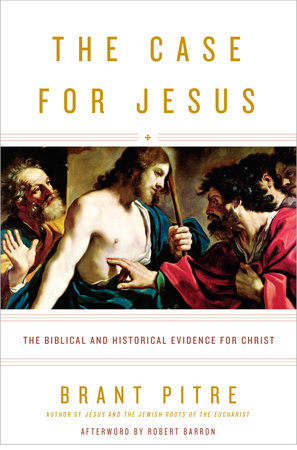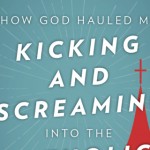 I decided to review Brant Pitre’s The Case for Jesus: The Biblical and Historical Evidence for Christ after seeing a post on the Patheos main Facebook account about the book. All the commenters on the post were atheists, and, to my surprise, the comments mocked the idea that Jesus ever existed.
I decided to review Brant Pitre’s The Case for Jesus: The Biblical and Historical Evidence for Christ after seeing a post on the Patheos main Facebook account about the book. All the commenters on the post were atheists, and, to my surprise, the comments mocked the idea that Jesus ever existed.
Literally every comment on the post was from an atheist denying not just the divinity of Jesus, but the very existence of Jesus.
This is the atheist equivalent of the belief among some Christians that the world is 6,000 years old. As an atheist I would have been ashamed to see this kind of ignorance among fellow non-believers. Even as a former atheist, I am a little embarrassed. Now as a believer, I am convinced that some atheists are just as anti-intellectual and anti-reason as some Christians. Truly, “flat earthers” can be found in every group.
After this experience, when I picked up the book I thought that Dr. Pitre would be defending the historical existence of Jesus. But this is not the main theme, (which is understandable because pretty much any ancient historian worth his salt believes that Jesus actually existed).
This book, rather, seems to be a response to the poison the historical critical method has become in modern Scripture scholarship. I use the word “poison” not because the historical critical method is useless or dangerous or unnecessary. It is a valuable and necessary part of Scripture scholarship. The historical critical method allows us to study the historical origins of the Scriptures and compare them to other texts written at the time in order to draw reasoned conclusions.
Dr. Pitre states his clear support for the historical critical method when he discussed his new book, The Case for Jesus, in a recent interview for America Magazine saying:
[S]ome students think that historical-critical investigation—i.e., using reason to explore the historical origins of Christianity—is a threat to faith. I don’t share that view. To the contrary, I think historical criticism is essential to the task of biblical exegesis. I also think it’s important for mature Christians to be able to approach their faith from the perspective of both faith and reason, both theology and history.
The method becomes a poison, however, when it is vociferously skeptical and the only method by which one reads Scripture. An unhealthy reliance on this method has led to a reading of Scripture, even by people of faith, that is drained of theological and spiritual meaning. And ultimately, although users of this method strive to be purely rational, the emphasis on skepticism can lead to scholarship that is actually unhinged from actual facts and reason.
During his pontificate, Benedict XVI, like Dr. Pitre, was very respectful of the historical critical method. He recognized the need for this approach, but he also passionately argued that Scripture scholarship and the historical critical approach need a renewal.
In his interview with Peter Seewald, Light of the World, Benedict XVI said:
The application of the historical method to the Bible as a historical text was a path that had to be taken. If we believe that Christ is real history, and not myth, then the testimony concerning him has to be historically accessible as well. In this sense, the historical method has also given us many gifts. … What is needed is not simply a break with the historical method, but a self-critique of the historical method; a self-critique of historical reason that takes cognizance of its limits and recognizes the compatibility of a type of knowledge that derives from faith. (emphasis mine)
I think that Dr. Pitre aims to write a self-critique of the historical method in The Case for Jesus. Using the very method which reached conclusions like “All of the Gospels are anonymous” and “The Gospels are folklore, not biographies,” Dr. Pitre works effectively to prove that by the very same method used to reach these conclusions, these notions can be proven wrong.
Why were scholars incorrect then, in the first place? Well some of these scholars are atheists, which in some cases, as is evident in my introduction, can lead people to ignore evidence that supports a contrary point of view. This, of course can happen on the flip side as well. But Dr. Pitre makes a good case that the biased, incorrect scholarship has been done by those trying to debunk Scripture. In other words, these scholars became lovers of their point of view, rather than the truth.
Dr. Brant Pitre covers the primary issues that are brought up by skeptics including:
- Were the four Gospels really anonymous?
- Are the Gospels folklore? Or are they biographies?
- Were the four Gospels written too late to be reliable?
- What about the so-called “Lost Gospels,” such as “Q” and the Gospel of Thomas?
- Did Jesus claim to be God?
- Is Jesus divine in all four Gospels? Or only in John?
- Did Jesus fulfill the Jewish prophecies of the Messiah?
- Why was Jesus crucified?
- What is the evidence for the Resurrection?
I recommend this book to anyone who is interested in these questions, even if you disagree with Dr. Pitre’s premise. He is careful to present both sides of these arguments before he argues against them. And I think anyone who is interested in these debates would find this book helpful.
I was also impressed by the clarity and organization of the book. After reading the first three chapters, I got a notebook and started over so that I could take notes. The book is methodical, clear, and very well-written. (And I do not give that praise lightly!)
If you are interested in a reasoned, faithful approach to Scripture, this book is a necessary addition to your library.
And finally, if you are disappointed that Dr. Pitre does not address the question of whether Jesus actually existed, there is a delicious irony in all of this. Dr. Pitre criticizes a scholar named Bart Ehrman quite frequently in The Case for Jesus. Ehrman is a nonbeliever and New Testament scholar whose skeptical debunking of Scripture has spread far and wide. But even Ehrman, does not go so far as to say Jesus never existed. In fact, he wrote a book defending the fact that Jesus existed. And you can watch his chagrin in this video when he responds to questions from atheists who defend this point of view.











